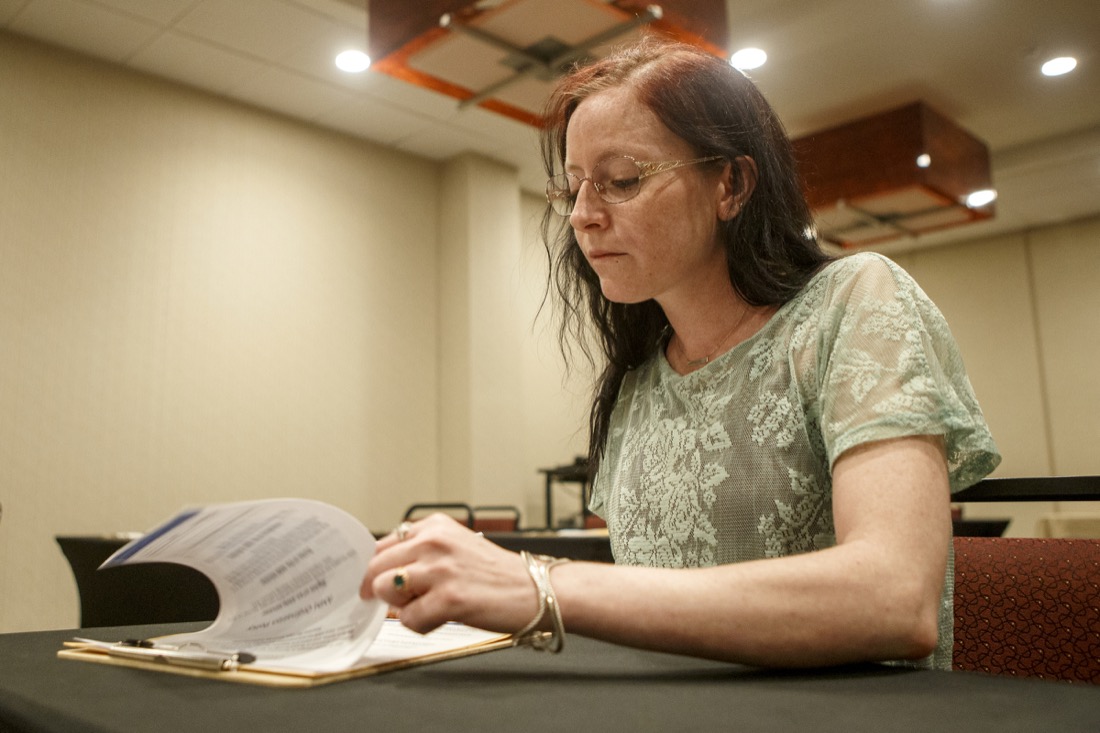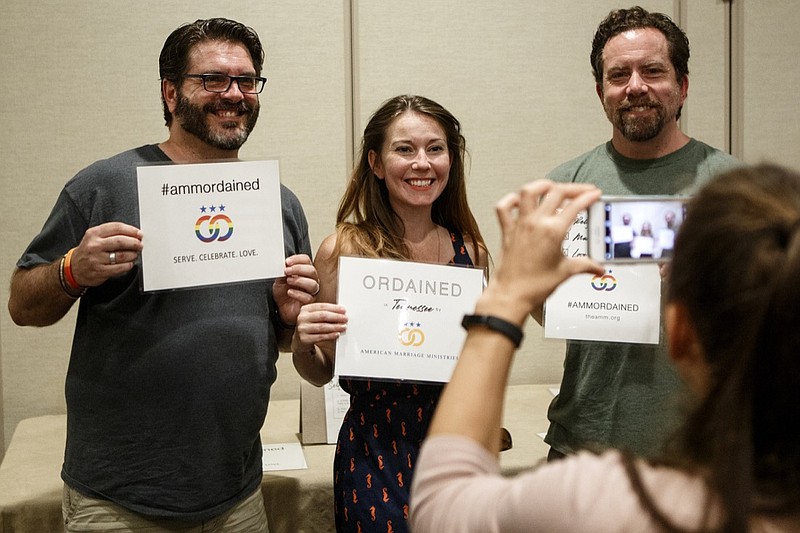With a few strokes of pens over three pieces of paper Tuesday afternoon, around 150 Chattanooga area residents subverted a new Tennessee law aimed at restricting who can officiate weddings in the state.
The Seattle-based organization American Marriage Ministries, which primarily operates an online ordination service, has been making stops across Tennessee, including at Hampton Inn & Suites at Hamilton Place on Tuesday, to offer in-person ordination training in response to a law scheduled to go into effect July 1 that would revoke online ordination certifications.
The law added local and state representatives to the list of officials able to officiate marriages, but other supporters of the the law acknowledged it was intended to stop Tennesseans from going online to become ordained ministers.
Lewis King, American Marriage Ministries executive director, said his organization was overwhelmed with messages after the law passed from people concerned about their licenses. The organization has more than 13,400 ministers in the state. The law changes put some upcoming weddings at risk, Lewis said.
"We have ministers that have weddings coming up in the next week, two weeks, three weeks and they need to be able to serve the communities they're working with," Lewis said.
To get around the law and recertify local people, attendees to the training had to fill out three pieces of paper: an application similar to the one online, an official request to become ordained and a signed affidavit certifying the ordination process occurred in person. The affidavit was added to the process to protect Tennessee residents from any challenge that might come because of the law change, King said.
Bobby Prince, 45, was among those being recertified Tuesday to perform weddings. The Chattanooga resident performed more than 100 weddings last year, he said, including for people who did not want to be married through the church or members of the LGBTQ community.
 Faithe Tilley fills out her paperwork to get ordained at the Hampton Inn at Hamilton Place on Tuesday, June 25, 2019 in Chattanooga, Tenn. Tilley works as an assistant to a wedding planner. Responding to the recent Tennessee law change outlawing online ordination programs American Marriage Ministries held an ordination training.
Faithe Tilley fills out her paperwork to get ordained at the Hampton Inn at Hamilton Place on Tuesday, June 25, 2019 in Chattanooga, Tenn. Tilley works as an assistant to a wedding planner. Responding to the recent Tennessee law change outlawing online ordination programs American Marriage Ministries held an ordination training.Opponents of the law, including Prince, said the bill was created to deter same-sex couples and members of the LGBTQ community from getting married. People in these groups sometimes avoid being married by someone in the church because of stigma or negative previous experiences.
"There's no secret that the bill was passed to deter [same-sex marriages]," Prince said. "It wasn't about heterosexual couples."
Getting ordained online was a way for Charlene Wright to fulfill a lifelong desire to be a minister. American Marriage Ministries helped make that possible in 2016 after her cousin asked the 51-year-old to perform a wedding.
Wright said the new law would block her from officiating the three weddings she had scheduled this year.
"I can't tell the people I can't marry them no more," she said.
King said the in-person training is part of American Marriage Ministries' resistance to the law change. They scheduled trainings in Chattanooga, Clarksville, Jackson, Memphis, Knoxville and Nashville. The group would support any legal challenges to the law, which King said is "patently unconstitutional."
On Friday, the Universal Life Church Monastery filed a lawsuit against the state to block the law, saying it violated the First and Fourteenth Amendments to the U.S Constitution.
Staff writer Andy Sher contributed to this story.
Contact Wyatt Massey at wmassey@timesfreepress.com or 423-757-6249. Find him on Twitter at @News4Mass.
